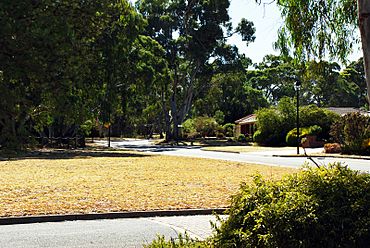Onkaparinga Hills, South Australia facts for kids
Quick facts for kids Onkaparinga HillsSouth Australia |
|||||||||||||||
|---|---|---|---|---|---|---|---|---|---|---|---|---|---|---|---|

Spriggs Road
|
|||||||||||||||
| Established | 1840s | ||||||||||||||
| Postcode(s) | 5163 | ||||||||||||||
| Location | 33.5 km (21 mi) from Adelaide | ||||||||||||||
| LGA(s) | City of Onkaparinga | ||||||||||||||
| Region | Southern Adelaide | ||||||||||||||
| County | Adelaide | ||||||||||||||
| State electorate(s) |
|
||||||||||||||
| Federal Division(s) | Kingston | ||||||||||||||
|
|||||||||||||||
Onkaparinga Hills is a beautiful suburb located south of Adelaide in South Australia. It's part of the City of Onkaparinga. This area covers about 22 square kilometers (that's about 8.5 square miles).
It's known for being a very green and leafy place. A big part of the suburb is even inside the Onkaparinga River National Park. This means there are lots of natural spaces to explore. In 2011, about 2,534 people lived here. The hills themselves are a cool example of how the Earth's crust can fold over time!
History of Onkaparinga Hills
Early Days: Kaurna People
Before Europeans arrived, the land of Onkaparinga Hills was home to the Kaurna people. They are the traditional owners of this land. The name Onkaparinga comes from their language. It means 'The Women's River', which is a special name for the river flowing through the area.
European Settlement and Growth
European settlers first came to Onkaparinga Hills in the 1840s. Many of these early settlers were farmers. They worked the land, growing crops and raising animals. Over time, some farmers also started planting vineyards. These vineyards grew grapes to make wine.
After a big war (in the mid-20th century), the area saw a lot of new buildings and homes. More development happened again in the early 1990s. Today, the number of people living in Onkaparinga Hills is quite steady. You can still see vineyards, farms, and grazing lands in different parts of the suburb.
 | DeHart Hubbard |
 | Wilma Rudolph |
 | Jesse Owens |
 | Jackie Joyner-Kersee |
 | Major Taylor |

